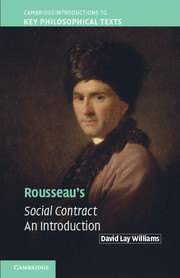Chapter 3 - Book III
Published online by Cambridge University Press: 05 June 2014
Summary
Overview
Book III has two objects. First, Rousseau continues to counsel lawmakers on how to best devise institutions. Second, he provides specific advice on how to maintain the authority of the people in the face of encroaching governmental powers. With regard to institutional design, Rousseau sketches the three fundamental governmental – or executive – forms: democracy, aristocracy, and monarchy. He is very clear throughout Book III and the Social Contract generally that there is no unique and universal single best regime type: “Hence the question, which is absolutely the best Government, does not admit to a solution because it is indeterminate.… [There are] as many good solutions as there are possible combinations in the absolute and the relative positions of peoples” (SC, 3.9.1, 104–5 [III: 419]). Each has its own particular set of assets and drawbacks. The key is to match the people and their circumstances to the appropriate form of government.
Regardless of which set of institutions a state adopts, it will always be vulnerable to decline and decay. Not even the vaunted constitutions of Sparta and Rome, Rousseau reminds us, were eternal. Most specifically in the latter pages of Book III, he is concerned about the government – however well designed it might have been – and its potential for destroying the state from within. It is an old adage that “power corrupts,” and this principle animates Rousseau’s concerns here. Specifically, the government or executive branch is a constant threat to the sovereign or legislative branch. And whenever the government succeeds in thwarting the sovereign, it effectively means that a particular will is thwarting the general will. So Rousseau introduces a series of measures to inhibit this kind of encroachment and safeguard the general will against internal threats.
- Type
- Chapter
- Information
- Rousseau's Social ContractAn Introduction, pp. 107 - 155Publisher: Cambridge University PressPrint publication year: 2014

